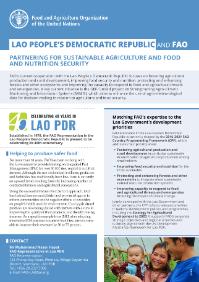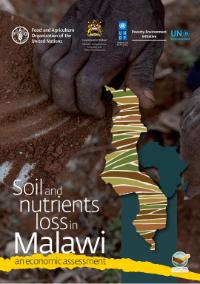Focal point
Location
The Food and Agriculture Organization of the United Nations leads international efforts to defeat hunger. Serving both developed and developing countries, FAO acts as a neutral forum where all nations meet as equals to negotiate agreements and debate policy. FAO is also a source of knowledge and information. We help developing countries and countries in transition modernize and improve agriculture, forestry and fisheries practices and ensure good nutrition for all. Since our founding in 1945, we have focused special attention on developing rural areas, home to 70 percent of the world's poor and hungry people.
Members:
Resources
Displaying 181 - 185 of 5074Guidance on spatial technologies for disaster risk management in aquaculture
This new guide describes the application of spatial technology to improve disaster risk management (DRM) within the aquaculture sector. DRM requires interrelated actions and activities to ensure early warning, prevention, preparedness, response and recovery for a wide range of natural, technological and complex disasters that can impact aquaculture operations and livelihoods.
Lao People’s Democratic Republic and FAO
FAO’s current cooperation with the Lao People’s Democratic Republic focuses on fostering agricultural
production and rural development, improving food security and nutrition, protecting and enhancingforests and other ecosystems and improving the capacity to respond to food and agricultural threatsand emergencies. A key current initiative is the GEF-funded project on Strengthening Agro-climaticMonitoring and Information Systems (SAMIS), which aims to enhance the use of agro-meteorologicalStrengthening Environment, Forest and Climate Change Capacity in Bangladesh - GCP BGD 053
Bangladesh is faced by a number of environmental crises, including an increase in the frequency and severity of extreme climatic events, a scarcity of natural resources and the degradation of the natural environment. Combined with high rates of poverty, these heighten vulnerability to environmental shocks. To address these challenges, effective investment in the environment and forestry sectors is essential.
Soil and nutrients loss in Malawi: an economic assessment
Soil loss is a major threat to agricultural development in Malawi, and the size of the agricultural sector in the Malawian economy renders it a major limitation to the overall economic development of the country. Soil loss reduces cultivable soil depth, but also takes away fertile soils from farmlands. The net effect is a loss of agricultural productivity, increased expenditure on fertilizers, and a general decline in profitability of crop production.
Guidance on spatial technologies for disaster risk management in aquaculture
This new guide describes the application of spatial technology to improve disaster risk management (DRM) within the aquaculture sector. DRM requires interrelated actions and activities to ensure early warning, prevention, preparedness, response and recovery for a wide range of natural, technological and complex disasters that can impact aquaculture operations and livelihoods.











